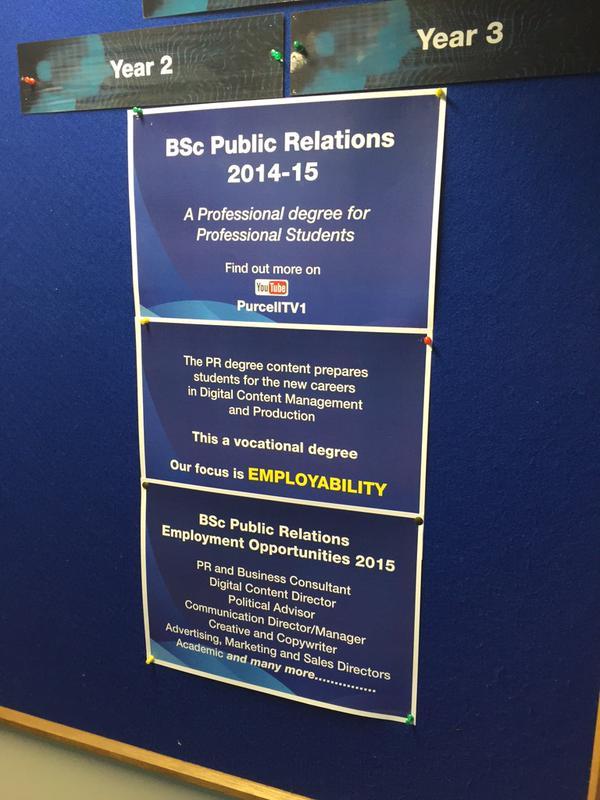As explained by former CIPR President Stephen Waddington on his blog last week, an online conversation over four weeks is taking place on Facebook to explore how Public Relations academics and practitioners can cooperate and collaborate.
Improving Links Between Academia and Practice
I’ve been involved in this work for the last year or so via guest lectures at the University of Ulster, volunteering for the Young Enterprise NI Schools Programme and helping various students with interviews for their dissertations.
I decided it was time to go one step further.
In previous Autumn Series on the blog I’ve interviewed PR Agency directors and in-house Communications Managers. In 2015, given my recent engagement with students (and how impressed I’ve been with their work) as well as the ongoing industry conversation to better improve the links between academia and practice, I decided to collaborate with the University of Ulster and offer a much more practical opportunity for students… Guest blogging.
One of the items up for discussion during this industry period of reflection particularly caught my eye:
Addressing the gap between research, publication and application
As I’m often asked to guest lecture on Digital PR and Social Media I knew that many of the pieces of research the students were carrying out lay in the digital side of things. And yet I also knew - from my own experience in business - that it is an area of practice many industry folk don’t feel as confident delivering as traditional media relations or communications strategy.
So what better way to offer the next generation a chance to take what they’ve discovered in their academic research (learning that the industry must begin to appreciate better and utilise further) and go through the practical process of turning it into a piece of digital communications by way of a blog post - honing their writing skills, social media understanding and professional online footprint/portfolio.
The invitation to engage is copied below and has been circulated to all final year and exiting Undergrad and Masters students in the University of Ulster‘s courses. It will then be extended out to others. I very much hope they take part so that we can add their learning to the conversation and give something back to them in a positive practical way as they embark on careers in a very different digital world to that which many of us started out in…
In a year when the PR industry is exploring possible collaboration and cooperation between PR practitioners, teachers and academics, I wanted to offer an opportunity for local students to take part in something that would:
- Give you the platform and audience to have a very practical experience of modern Digital PR Communications
- Provide you with what may be your first step towards creating an online portfolio and digital footprint for your future career
- Offer you the opportunity to be seen in front of your future employers and practice a skill that is increasingly being required by the future PR Agency model - writing for online audiences
I want you to write a blog post. Sound simple?
Depending on where you are in your studies, you can choose to write about a topic that you are thinking of researching or you could summarise a piece of work or dissertation you have already completed. For example:
- “I am going to write about X because I can’t find much research on it but its important”
- “I am going to summarise my dissertation on X”
- I am going to write about X which I have chosen it as my dissertation topic because…”
So how does an online blog post differ from other forms of communication?
- It should be ideally min 600, max 1,500 words (harder than it sounds!)
- Include hyperlinks to any research/articles/companies referenced in your piece
- Know your audience and write in a style that will appeal
- Suggest 4-7 tag words or phrases that you think your article should be indexed with
- Utilise visual formats such as sub-headings, bullet points or numbers and short paragraphs
- Images can range from existing content, to your own photography, to simple infographics and Canva graphics. Check the copyright where available and include the hyperlink to credit
- Include your byline at the end - your name, what you do/study, where you live/work/study and your Twitter or other social links. Also include Twitter names for anyone mentioned in your post
Once you send it to me ([email protected]) I will review, schedule and socially promote each article, sending you the link by email once it goes online so that you can track comments and shares and get involved in discussion.
At the end of the series (November 2015) I will review all the posts and feedback and you will have become part of the wider industry debate on an important issue. You will have also added another very pertinent and practical project and one more reference (me!) to your CV.
I very much look forward to hearing what you have to say and learning from you,
Leanne

